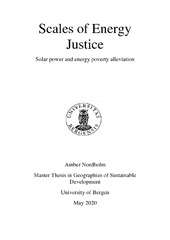| dc.description.abstract | The threats climate change poses require rapid and wide decarbonization efforts in the energy sector. Historically, traditional, large-scale energy operations have frequently led to energy-related injustices. Energy poverty is one such injustice that has gained attention as an important issue to address within low-carbon energy transitions. Energy poverty (the condition of being unable to access an adequate level of household energy services) persists despite the existence of renewable energy technologies, such as solar photovoltaics (PV), which offer cheap, clean, and highly scalable energy. Historical injustices and the modularity of solar PV offers new possibilities in ownership, production and distribution of energy and calls into question the traditional scalar approach to energy operations. This thesis reports on a case study of solar power in Lisbon, Portugal. It investigates the potential of solar PV to alleviate energy poverty and the role of scale in energy justice in relation to renewable energy transformations. The case consists of eight weeks of field work which generated insights on community and expert perspectives. Methods used in the field are non-attribution, semi-structured interviews, and field observations. Secondary research methods included deskwork and document analysis. Interviews were analyzed using the qualitative data analysis program NVivo and through comparison to relevant grey and academic literature. I used an energy justice framework to identify and discuss justice aspects of solar PV uptake at different scales. Results indicate that energy justice is shaped in diverse ways at different scales, and that scale matters for energy justice. The Lisbon case illustrates how small- and medium-scale approaches to energy distribution can address energy justice concerns. The study finds that such approaches are gaining attention and legitimacy, but do not yet include all socio-economic groups. It moreover shows how large-scale approaches to energy are potentially well-equipped to make renewable technologies, such as solar PV, widely accessible. | en_US |
